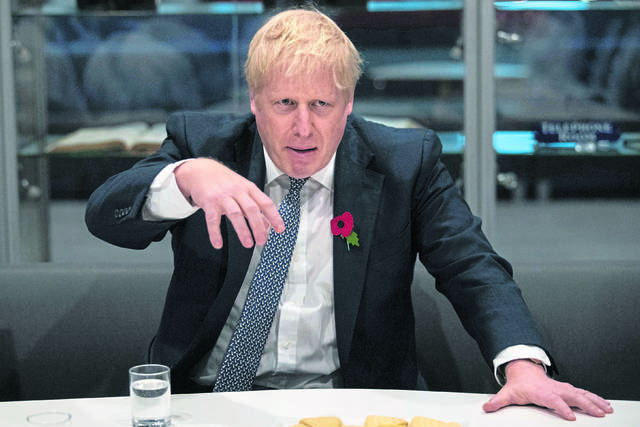In Thursday’s elections, Boris Johnson has a decent shot at winning a workable majority in Parliament to pull the U.K. out of the European Union. This could be a turning point for Europe — rather than enabling consolidation of the continental bloc, Brexit will provide the contrast that blows it apart.
The Conservative Party is running on a platform to push through a transition agreement to leave the European Customs Union and accomplish simple free trade. The Labour Manifesto — offering yet another referendum and a socialist platform to tax the wealthy, re-nationalize rail, telecom and other industries, aggressive carbon-neutral economy initiatives, and more social spending — appears further left than the British electorate.
Johnson’s chances hinge on flipping traditional Labour strongholds in the North and Midlands jolted by globalization, immigration and the EU progressive agenda. Forces driving populism and nationalism in places like Poland and Hungary appear to advantage Johnson — even if voters don’t adhere to his apparent vision of a post-Brexit Singapore on the Thames.
The eurozone suffers economic stagnation. Growing about 1% annually, it has little room for additional monetary stimulus after years of negative interest rates and massive European Central Bank government-bond purchases. Eurozone rules for national budget deficits preclude additional fiscal stimulus in Spain, France, Italy and Greece, which average 12% unemployment.
If these economies had their own currencies, they could devalue to boost exports and spend more on education and infrastructure to offset Germany’s perennially large budget and trade surpluses.
Europe lacks the building blocks for a common currency. These include continental bank regulation and deposit insurance, European taxing authority to transfer resources for social services and the like from richer to poorer states — as Washington does from New York to Mississippi — and a fluid cross-border labor market enabled by a common language and homogenous educational system.
Near term, the U.K. needs free-trade access with the continent to keep its manufacturing going, but it is not so invested in the internal combustion engine. Britain’s future, like America’s, is tied to its formidable financial sector and high-tech activities.
Britain’s natural alliances in high tech are with the U.S. Northeast and West Coast. Freedom to negotiate free trade with the United States will enable cooperation and competition — a critical advantage that the U.K. can’t have inside the EU. France’s agricultural protectionism and Germany’s mercantilism preclude a comprehensive U.S.-EU agreement.
Europe will continue cycles of anemic growth and emerge from recessions with ever-more underemployment, insecure, temporary and part-time jobs, and more disaffected like the Yellow Jackets.
That economic contrast with Britain will feed populism and nationalism in Southern and Eastern Europe and in France and Germany beyond the Paris and Frankfort metropoles. That is not xenophobia as elites in Brussels and privileged elites may dismiss but a disaffection begotten by a EU progressivism that accomplishes progress on the backs of the working classes.
Either the French proletariat will revolt, or ordinary Italians or others will simply vote to exit the euro or EU altogether — and bring the European project down under the weight of its follies.
Peter Morici is an economist and business professor at the University of Maryland. George Will is off this week.








